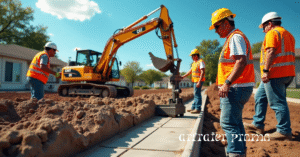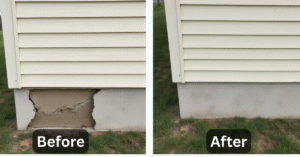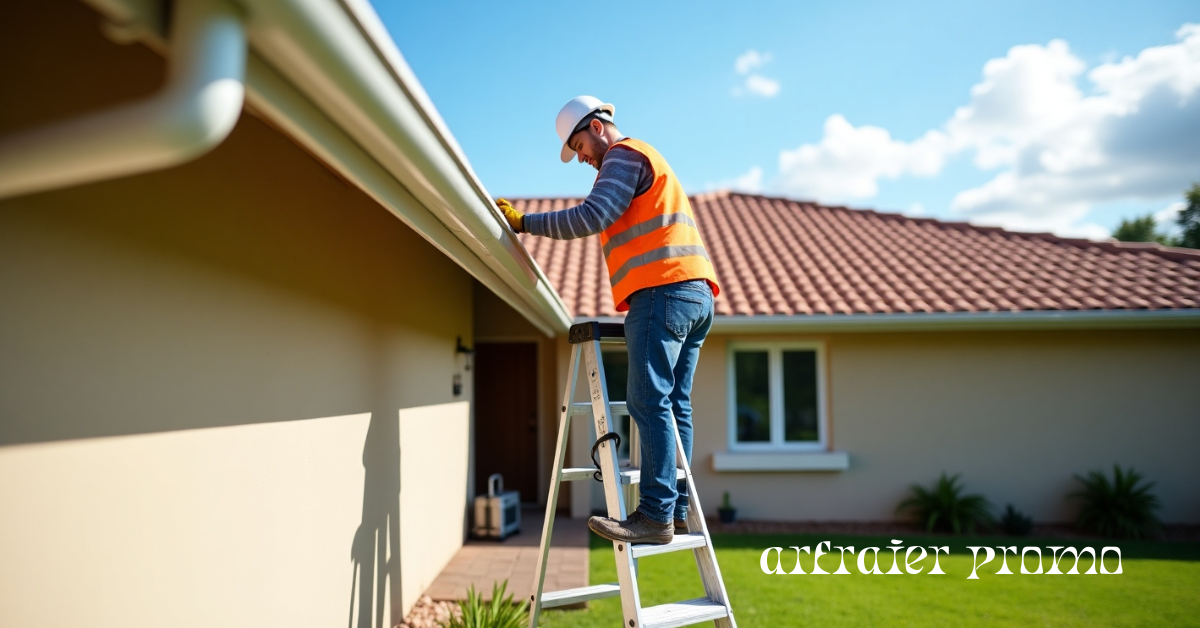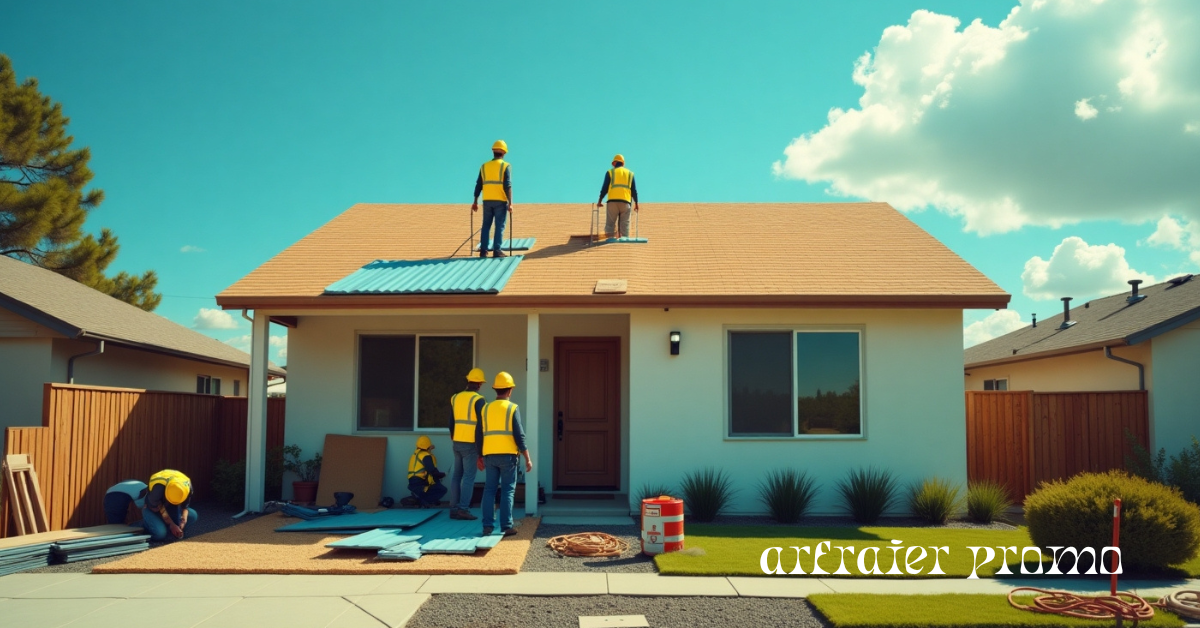A home’s foundation is more than just concrete beneath your feet—it’s the core structure that supports everything above. Over time, many homes develop foundation issues due to natural settling, moisture problems, or structural stress. In fact, foundation damage is one of the most expensive and widespread issues homeowners face in North America.
This guide will help you understand what foundation repair involves, common signs of damage, causes, repair methods, and when to call in a professional. If you’re a homeowner or real estate investor, this article will provide both insight and direction for protecting your property investment.
Common Signs You Need Foundation Repair
Recognizing foundation problems early can save you thousands of dollars in repair costs. Some warning signs are obvious, while others may seem minor but point to larger issues underneath.
-
Cracks in interior or exterior walls, especially near doors and windows
-
Uneven or sagging floors
-
Doors and windows that are difficult to open or close
-
Gaps between walls, ceilings, or baseboards
-
Water pooling around the foundation after rain
-
Cracked or uneven tiles and floors
-
A leaning chimney or stair-step cracks in brickwork
If you notice any combination of these signs, your home may need foundation inspection and repair.
What Causes Foundation Damage?
Several factors can cause or accelerate foundation damage. Understanding the source is key to finding the right repair solution.
-
Expansive Soil: Some types of soil, such as clay, expand when wet and shrink when dry, putting pressure on your foundation.
-
Poor Drainage: Water that collects near the foundation can cause soil erosion or weaken the structure.
-
Plumbing Leaks: Undetected leaks under the foundation can lead to shifting or sinking.
-
Tree Roots: Roots from large trees may grow under your home, disturbing the foundation.
-
Seismic Activity or Flooding: Natural events like earthquakes or heavy floods can destabilize the soil and structure.
-
Improper Construction: Foundations that lack proper reinforcement or depth are more prone to failure over time.
Each of these causes may require a different repair method, so identifying the root problem is critical.
Types of Foundation Repair Methods
Foundation problems range from cosmetic cracks to serious structural instability. Several professional foundation repair methods are used depending on the situation.
| Repair Method | Best For | Description |
|---|---|---|
| Slabjacking | Sunken concrete slabs | Injects grout beneath slab to raise and stabilize |
| Piering (Underpinning) | Major foundation shifting or sinking | Steel piers anchor the foundation deep into stable soil |
| Crack Sealing | Surface cracks in concrete or walls | Epoxy or polyurethane sealants fill and bond cracks |
| Waterproofing | Water intrusion and moisture problems | Involves sealing foundation walls and improving drainage |
| Soil Stabilization | Loose or shifting soil conditions | Chemical or mechanical solutions to improve soil density |
These techniques vary in complexity, cost, and long-term results. A professional assessment can determine which option is best for your situation.

DIY vs. Professional Foundation Repair
While some homeowners attempt to patch cracks or re-level small areas themselves, foundation work is often best left to experienced professionals.
| Aspect | DIY Repair | Professional Repair |
|---|---|---|
| Cost | Lower upfront cost | Higher cost but long-term value |
| Skill Required | Basic to intermediate | Advanced tools and engineering expertise |
| Risk of Mistakes | High (can worsen the issue) | Low (certified and insured service) |
| Best For | Minor cracks or sealing | Structural issues, leveling, piering |
| Warranty/Guarantee | No warranty | Usually includes warranty and post-repair check |
Many DIY repairs only address cosmetic problems without fixing the underlying cause, leading to recurring issues. Professionals not only fix the visible symptoms but also stabilize the structure.
How Much Does Foundation Repair Cost?
The cost of repairing a foundation varies based on the method used, extent of damage, and your region. Here’s a general pricing guide:
-
Minor crack repairs: $250 – $800
-
Slabjacking: $500 – $1,500
-
Waterproofing: $2,000 – $6,000
-
Piering/Underpinning: $8,000 – $25,000+
Additional factors include:
-
Soil conditions
-
Permit requirements
-
Accessibility
-
Type of foundation (slab, crawl space, basement)
Hiring a qualified professional for an inspection (usually $300–$500) is a worthwhile investment before committing to any repair work.
When to Call a Foundation Repair Specialist
While some minor cracks may not require urgent attention, the following signs call for professional evaluation:
-
Cracks growing wider over time
-
Interior walls or ceilings showing visible separation
-
Persistent water leakage near the base of your home
-
Unexplained mold or musty smells
-
Multiple doors/windows misaligned simultaneously

A licensed foundation contractor can assess the damage, determine the cause, and provide a long-term repair plan with warranty options.
Conclusion
Foundation issues don’t fix themselves—they get worse over time. Delaying repairs can lead to structural damage, plumbing issues, and increased home repair costs. Addressing foundation damage early not only protects your home’s safety and value but also saves you money in the long run.
If you suspect foundation problems, don’t wait. Contact a certified foundation repair specialist today for a detailed inspection and peace of mind.
Frequently Asked Questions (FAQs)
Q1. Is foundation repair covered by insurance?
Typically, homeowners insurance does not cover damage caused by settling or soil issues. However, damage caused by plumbing leaks, floods, or earthquakes may be covered if you have the proper add-ons.
Q2. How long does foundation repair take?
Minor repairs can take one to two days, while major projects like piering may take one to three weeks, depending on weather and site conditions.
Q3. Can I live in my house during foundation repair?
Yes, for most projects. However, extensive leveling or structural adjustments might require temporary relocation.
Q4. Will foundation repair increase my home value?
Yes, especially if the repair comes with a warranty. Buyers and appraisers value homes with a secure, documented foundation history.
Q5. Does one repair prevent future problems?
If done correctly, yes. Professional repairs often include soil stabilization and drainage solutions to prevent recurrence.






